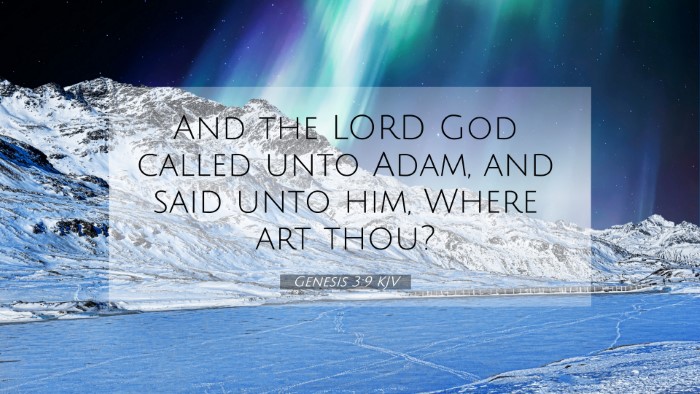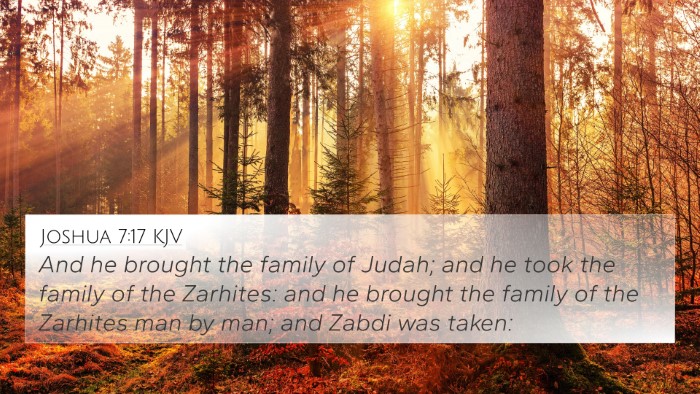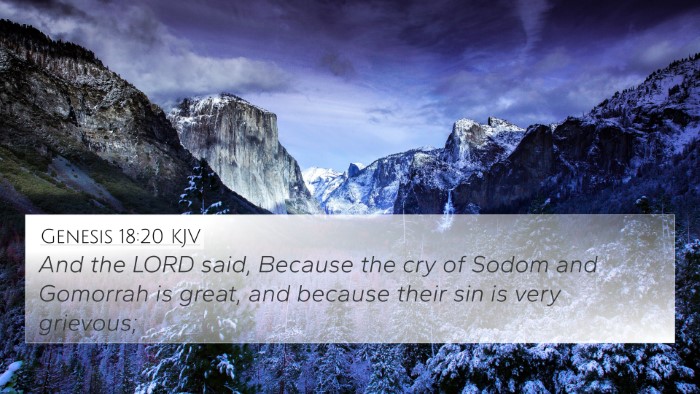Understanding Genesis 3:9
The verse Genesis 3:9 states: "But the LORD God called to the man, 'Where are you?'". This question posed by God to Adam following the first sin has profound implications for understanding the relationship between humanity and the divine.
Contextual Overview
In the Genesis narrative, this verse occurs after Adam and Eve disobey God's command by eating from the tree of the knowledge of good and evil. Their disobedience leads to shame, guilt, and a hidden attempt to escape from God’s presence. Thus, God's inquiry serves as both a call to accountability and an invitation to restoration.
Commentary Insights
- Matthew Henry: Henry emphasizes that God's call is not merely a question of location but a deeper inquiry into Adam's spiritual state. This highlights God’s desire for a relationship, indicating that spiritual alienation from God is more severe than physical separation.
- Albert Barnes: Barnes notes that God, being omniscient, knew where Adam was, yet He asks the question to provoke reflection in Adam. This suggests that God’s call invites self-examination and repentance.
- Adam Clarke: Clarke interprets God's question as a demonstration of divine mercy. Rather than punishment, God seeks to restore communion with Adam, illustrating His compassionate character.
Key Themes
- The Pursuit of God: This verse reflects God’s nature to seek and call His creation back to Himself, demonstrating His love and desire for relationship over mere obedience.
- Accountability: It serves to illustrate humanity’s need to confront one’s actions in the light of divine scrutiny.
- Grace and Restoration: Instead of immediate punishment, the emphasis on God’s question points to the grace that offers a chance for redemption.
Cross-References and Thematic Connections
Genesis 3:9 is interconnected with numerous Bible verses that illuminate its significance. Below are biblical cross-references that relate to this verse:
- Genesis 4:9: God’s continued questioning of Cain mirrors His inquiry to Adam, indicating a pattern of divine engagement with humanity’s moral failure.
- Isaiah 50:2: This verse reflects God's disappointment in Israel, echoing the theme of seeking those who are lost.
- John 3:19-20: These verses articulate the darkness that results from sin, showing humanity’s tendency to hide from God, similar to Adam and Eve’s response.
- Hebrews 4:13: This passage emphasizes that no creature is hidden from God’s sight, connecting back to the awareness of divine observation seen in Genesis 3:9.
- Revelation 3:20: Christ's invitation to the Laodiceans echoes God’s outreach to Adam, emphasizing the theme of divine seeking and communion.
- Romans 5:12: This verse establishes the theological implications of Adam’s sin, linking back to the events in Genesis.
- Luke 19:10: Jesus declares his purpose to seek and save the lost, a continuation of God’s inquiry in Genesis.
- Psalm 139:7-12: This psalm expresses the omnipresence of God, confirming that no one can escape from God's awareness, much like Adam attempted to do.
- James 4:8: The call to "draw near to God" resonates with God’s question in Genesis, highlighting the importance of return and reconciliation.
- 1 John 1:9: The promise of forgiveness reflects God’s longing for us to acknowledge and confess our sins, akin to Adam being called to confess.
Theological Reflections
In approaching Genesis 3:9, readers are invited to reflect on the broader implications of sin and accountability. The need for restoration and acceptance of God's relentless pursuit becomes an essential theme throughout Scriptures. Each cross-reference amplifies this theme, making Genesis 3:9 a pivotal moment in the context of salvation history.
Conclusion
In summary, Genesis 3:9 is not just a historical narrative but an ongoing dialogue that speaks to the human condition. By acknowledging both God’s question and the answers it elicits, believers can engage in a transformative journey toward understanding their relationship with the divine.
Further Study and Reflection
For deeper understanding, one might consider utilizing a bible concordance or a bible cross-reference guide to explore these themes further. Understanding how different Bible verses relate to each other enhances one’s grasp of scriptural truths and the overarching narrative of redemption.
Engagement with Proverbs 3:6 reminds us: "In all your ways acknowledge Him, and He shall direct your paths." Thus, reflecting on Genesis 3:9 calls us back to a position of acknowledging God, encouraging a continual dialogue of faith.








